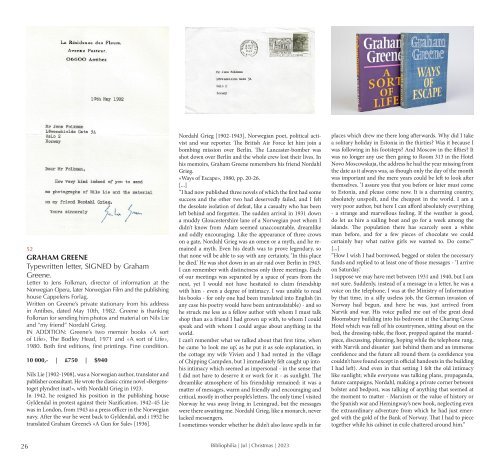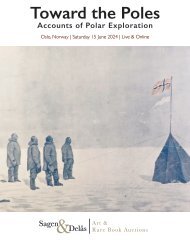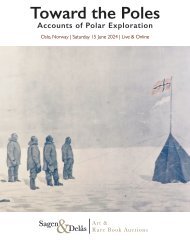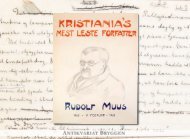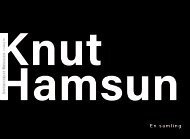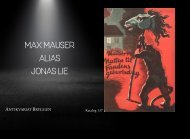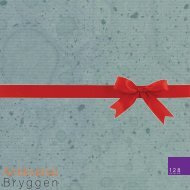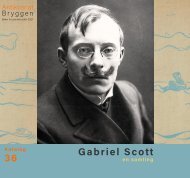Antikvariat Bryggen - Jul | Christmas | 2023
- No tags were found...
You also want an ePaper? Increase the reach of your titles
YUMPU automatically turns print PDFs into web optimized ePapers that Google loves.
52<br />
GRAHAM GREENE<br />
Typewritten letter, SIGNED by Graham<br />
Greene.<br />
Letter to Jens Folkman, director of information at the<br />
Norwegian Opera, later Norwegian Film and the publishing<br />
house Cappelens Forlag.<br />
Written on Greene’s private stationary from his address<br />
in Antibes, dated May 10th, 1982. Greene is thanking<br />
Folkman for sending him photos and material on Nils Lie<br />
and ”my friend” Nordahl Grieg.<br />
IN ADDITION: Greene’s two memoir books «A sort<br />
of Life», The Bodley Head, 1971 and «A sort of Life»,<br />
1980. Both first editions, first printings. Fine condition.<br />
10 000,- | £750 | $940<br />
Nils Lie [1902-1908], was a Norwegian author, translator and<br />
publisher consultant. He wrote the classic crime novel «Bergenstoget<br />
plyndret inat!», with Nordahl Grieg in 1923.<br />
In 1942, he resigned his position in the publishing house<br />
Gyldendal in protest against their Nazification. 1942–45 Lie<br />
was in London, from 1943 as a press officer in the Norwegian<br />
navy. After the war he went back to Gyldendal, and i 1952 he<br />
translated Graham Greene’s «A Gun for Sale» [1936].<br />
Nordahl Grieg [1902-1943], Norwegian poet, political activist<br />
and war reporter. The British Air Force let him join a<br />
bombing mission over Berlin. The Lancaster-bomber was<br />
shot down over Berlin and the whole crew lost their lives. In<br />
his memoirs, Graham Greene remembers his friend Nordahl<br />
Grieg.<br />
«Ways of Escape», 1980, pp. 20-26.<br />
[...]<br />
”I had now published three novels of which the first had some<br />
success and the other two had deservedly failed, and I felt<br />
the desolate isolation of defeat, like a casualty who has been<br />
left behind and forgotten. The sudden arrival in 1931 down<br />
a muddy Gloucestershire lane of a Norwegian poet whom I<br />
didn’t know from Adam seemed unaccountable, dreamlike<br />
and oddly encouraging. Like the appearance of three crows<br />
on a gate, Nordahl Grieg was an omen or a myth, and he remained<br />
a myth. Even his death was to prove legendary, so<br />
that none will be able to say with any certainty, ’In this place<br />
he died.’ He was shot down in an air raid over Berlin in 1943.<br />
I can remember with distinctness only three meetings. Each<br />
of our meetings was separated by a space of years from the<br />
next, yet I would not have hesitated to claim friendship<br />
with him - even a degree of intimacy. I was unable to read<br />
his books - for only one had been translated into English (in<br />
any case his poetry would have been untranslatable) - and so<br />
he struck me less as a fellow author with whom I must talk<br />
shop than as a friend I had grown up with, to whom I could<br />
speak and with whom I could argue about anything in the<br />
world.<br />
I can’t remember what we talked about that first time, when<br />
he came ’to look me up’, as he put it as sole explanation, in<br />
the cottage my wife Vivien and I had rented in the village<br />
of Chipping Campden, but I immediately felt caught up into<br />
his intimacy which seemed as impersonal - in the sense that<br />
I did not have to deserve it or work for it - as sunlight. The<br />
dreamlike atmosphere of his friendship remained: it was a<br />
matter of messages, warm and friendly and encouraging and<br />
critical, mostly in other people’s letters. The only time I visited<br />
Norway he was away living in Leningrad, but the messages<br />
were there awaiting me. Nordahl Grieg, like a monarch, never<br />
lacked messengers.<br />
I sometimes wonder whether he didn’t also leave spells in far<br />
places which drew me there long afterwards. Why did I take<br />
a solitary holiday in Estonia in the thirties? Was it because I<br />
was following in his footsteps? And Moscow in the fifties? It<br />
was no longer any use then going to Room 313 in the Hotel<br />
Novo Moscowskaja, the address he had the year missing from<br />
the date as it always was, as though only the day of the month<br />
was important and the mere years could be left to look after<br />
themselves. ’I assure you that you before or later must come<br />
to Estonia, and please come now. It is a charming country,<br />
absolutely unspoilt, and the cheapest in the world. I am a<br />
very poor author, but here I can afford absolutely everything<br />
- a strange and marvellous feeling. If the weather is good,<br />
do let us hire a sailing boat and go for a week among the<br />
islands. The population there has scarcely seen a white<br />
man before, and for a few pieces of chocolate we could<br />
certainly buy what native girls we wanted to. Do come.’”<br />
[...]<br />
”How I wish I had borrowed, begged or stolen the necessary<br />
funds and replied to at least one of those messages - ’I arrive<br />
on Saturday.’<br />
I suppose we may have met between 1931 and 1940, but I am<br />
not sure. Suddenly, instead of a message in a letter, he was a<br />
voice on the telephone. I was at the Ministry of Information<br />
by that time, in a silly useless job, the German invasion of<br />
Norway had begun, and here he was, just arrived from<br />
Narvik and war. His voice pulled me out of the great dead<br />
Bloomsbury building into his bedroom at the Charing Cross<br />
Hotel which was full of his countrymen, sitting about on the<br />
bed, the dressing-table, the floor, propped against the mantelpiece,<br />
discussing, planning, hoping while the telephone rang,<br />
with Narvik and disaster just behind them and an immense<br />
confidence and the future all round them (a confidence you<br />
couldn’t have found except in official handouts in the building<br />
I had left). And even in that setting I felt the old intimacy<br />
like sunlight; while everyone was talking plans, propaganda,<br />
future campaigns, Nordahl, making a private corner between<br />
bolster and bedpost, was talking of anything that seemed at<br />
the moment to matter - Marxism or the value of history or<br />
the Spanish war and Hemingway’s new book, neglecting even<br />
the extraordinary adventure from which he had just emerged<br />
with the gold of the Bank of Norway. That I had to piece<br />
together while his cabinet in exile chattered around him.”<br />
26 Bibliophilia | <strong>Jul</strong> | <strong>Christmas</strong> | <strong>2023</strong>


